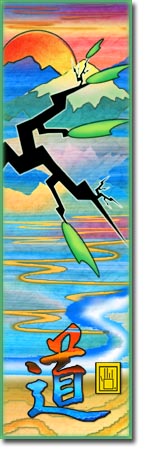On The Way: The Daily Zen Journal
Treatise on the True Sudden Enlightenment School – Part 1
Guifeng Zongmi (780–841)
Question: How do we accord with inner truth to enter into enlightenment?
Answer: When you do not give rise to false states of mind and are forever formless, this is according.
Question: What is according to the Path?
Answer: A straightforward mind not attached to anything accords with the Path.
Question: What is falsity?
Answer: Falsity is not knowing inherent mind.
Question: What is error?
Answer: Error is giving rise to all sorts of objects.
Question: What is inherent mind: What is false mind?
Answer: If you differentiate, it is false mind. If you do not differentiate, it is inherent mind.
Question: Where are they born from, the mind that differentiates and the mind that does not?
Answer: The mind that differentiates is born from error. The mind that does not differentiate is born from correct wisdom.
Question: Considered together, where are they born from?
Answer: There is nowhere they are born.
Question: If there is nowhere they are born, how can you say there is error or correct wisdom?
Answer: If you do not know inherent mind, you will proceed with all sorts of error. If you know inherent mind, this is correct wisdom. 
Question: You just spoke of knowing and not knowing; what are these born from?
Answer: Knowing is born from awakening. Not knowing is born from false thinking.
Question: All sentient beings are in false thinking; how can they also be in correct wisdom?
Answer: All sentient beings are within correct wisdom; there is really no false thinking.
Question: Right now we are engaged in false thinking; how can we be said to have correct wisdom?
Answer: In reality, you are fundamentally without false thinking. When you call it false thinking, this is like a person drinking a potion that dilates the pupils, then looking for a needle in the sky: in the sky there is really no needle.
Question: Given that fundamentally false thinking does not exist, what are all today’s practitioners trying to cut off in order to seek the Path?
Answer: Nothing is cut off, and there is no path that can be sought.
Question: If there is no path to be sought and nothing to be cut off, then why in the scriptures did the World Honored One speak of cutting off false thinking?
Answer: In reality the World Honored One did not teach cutting off false thinking. As for cutting off false thinking: without detaching from false thinking, all sentient beings falsely feel that there is something attained and something cut off; they falsely perceive that the phenomena of false thinking exist.
Following the concepts of sentient beings, the World Honored One spoke provisionally in terms of phenomena of false thinking. In reality, he did not speak a word of it. He was like a good doctor prescribing medicine for a disease. If there is no disease, he does not prescribe medicine.
Guifeng Zongmi (780–841)
Excerpted from Zen Dawn-Early Zen Texts from Tun Huang Edited by J.C. Cleary




If you’ve ever listened to a student questioning a teacher, sometimes it feels like the above excerpt. Sometimes it can be difficult for the student to let go of the drive to “understand.”
The problem with this kind of knowledge is how limited any answer can be for the questioner. But the other side of this dialogue is that when you are listening or reading a piece like this, a stillness comes over the listener that is closer than any answer we could receive.
Like being caught in a whirlpool of thought, the endless churning can throw us into a center of calm. At some point, thought settles, and the mind is clear once again.
From Stillness,
Elana, Scribe for Daily Zen